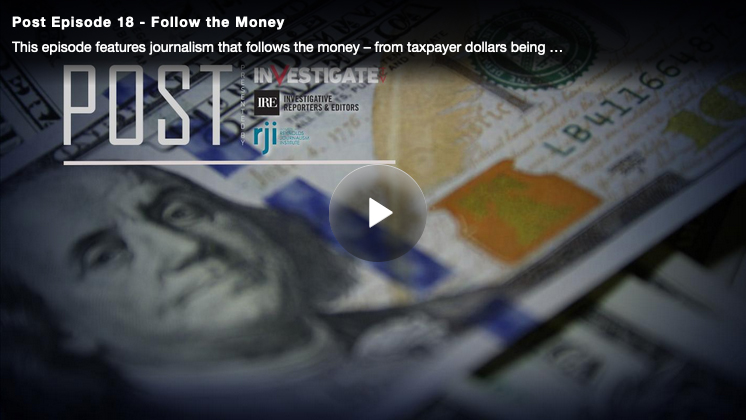Post Episode 18: Reporters use documents and data to follow the money

This episode features journalism that follows the money — from taxpayer dollars being misspent to the cost of settlements. Kaiser Health News reporter Liz Lucas discusses her work on “Liquid Gold” about doctors pulling in big money from urine tests.
In Episode 18, Post discusses stories that follow the money — from taxpayer dollars being misspent to doctors pulling in major profits from urine tests.
This episode features work from KARE 11 television, NBC Chicago, Detroit Free Press, CNN and Kaiser Health News. Each of the stories was an entry into IRE contests.
The first part of the episode focuses on stories involving public dollars and funding. Charles Minshew, IRE’s Director of Data Services, discussed the stories and the reporters’ information submitted in IRE contest entry forms. He also talked about best practices for data-driven stories involving finances.
In one story, KARE 11 reporters discovered a double billing scheme for police cars that amounted to Minnesota taxpayers losing out on $1 million. Fundamentally, Minshew said the most important aspect in the beginning was a source tip — and that source was valuable.
“This story came from a person who gave the station a tip, and this guy is someone who took some of this information to investigators and they didn’t listen to him. So it’s always good to have a knowledgeable source like this that can help you unravel this thread,” Minshew said.
Beyond that, journalists A.J. Lagoe and Steve Eckert had to do some pretty tedious work to dig into the scope of the problem. That serves as an example of the importance of local investigative journalists working on local issues that wouldn’t necessarily be picked up by a national outlet.
“They had to go through thousands and thousands of poorly-worded contracts to get to the bottom of this,” Minshew said. “KARE’s going to be one of the only watchdogs that can take this kind of action and do this kind of digging.”
NBC Chicago’s story “You Too, The Public Cost of Sexual Harassment” talks about the financial cost of sexual harassment when it comes to settlement money.
“This is a story that goes with probably one of the most important topics of our generation,” Minshew said.
In terms of reporting, Minshew discussed how difficult it can be to uncover the scope of issues that officials may want to keep quiet.
“No court of law, no agency makes it easy to go and find these records,” Minshew said. “These settlements are happening kind of in backrooms, they’re not happening publicly. Victims are told, ‘You can get this money, this settlement, but you’re going to have to be quiet.’”
The second half of the episode features data journalist Liz Lucas from Kaiser Health News (KHN). She discusses her team’s work on a story called “Liquid Gold,” which looks at how much money doctors make from urine testing, particularly associated with pain management.
KHN found an estimated $8.5 billion a year is going toward drug tests – and some individual doctors are cashing in big.
“We found out that some doctors are pulling in a million or more each year in urine testing,” Lucas said. “What we found is that a doctor can run their own lab, so they both treat patients for pain management and then process urine testing with the same patients.”
The tests are standard for patients on certain pain medications to check for drug interactions, levels, etc. But KHN identified cases where doctors were ordering a lot of tests and multiple tests on each cup of urine, billing for each one.
“Doctors having their own labs isn’t necessarily illegal. But with the opioid crisis, we continually see an uptick. There was an opening for incredible profit. So we went into the Medicare data to see: What are doctors able to pull in, just from urine testing? And it was huge numbers,” Lucas said.
In addition to discussing the results of the story and how the journalists arrived at the numbers, Lucas also gives journalists tips on how to fact-check and create best practices for doing data-driven stories.
“We have a hard-and-fast rule at KHN, particularly around data, which is that any number in a story that we calculate has to be checked from the original source data to that number – by somebody who wasn’t involved in that story,” Lucas said.
Lucas also gives her three biggest rules at the end of the show – all things any journalist should consider.
Stories discussed in Post, Episode 18
- KARE-11 Police car overcharges top $1 million
- NBC Chicago – You, Too – The Public Cost of Sex Harassment
- Detroit Free Press – In Donors We Trust
- CNN – The more opioids doctors prescribe, the more money they make
- Kaiser Health News – Liquid Gold
Post is a media review program from InvestigateTV, Gray Television’s streaming channel dedicated to in-depth and watchdog reporting. Post is presented in partnership with the journalism organization Investigative Reporters and Editors. The monthly program is taped at the
Reynolds Journalism Institute at the University of Missouri School of Journalism, a partner of InvestigateTV.
Episode written and produced by: Emma Ruby and Jamie Grey, InvestigateTV
Production by: Director Travis McMillen and assistant Sarah Sabatke, Reynolds Journalism Institute and University of Missouri
Editing by: Owen Hornstein and Jamie Grey, InvestigateTV

Comments